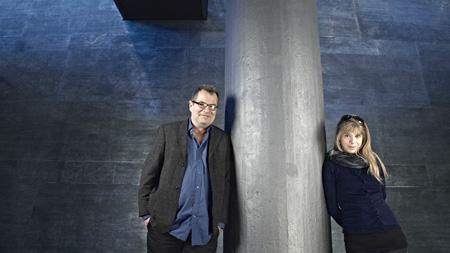One, petite, speaks insistently in a dialect worthy of a Copenhagen longshoreman. The other is laid back, contemplative, with a radio announcer's modulated baritone. Kim Leona has scripted some of the most outstanding features in recent Danish cinema, notably teaming up with director Per Fly on his Denmark trilogy, "The Bench", "Inheritance" and "Manslaughter". Steen Bille recently co-wrote Niels Arden Oplev's internationally awardwinning "We Shall Overcome". Now they are applying their dramaturgical experience in the search for original Danish fiction films.
That may sound a bit arrogant, but it’s not for them to decide what cinematic art is.
Can a Writer be too Skilled?
An opening question about what films have most impressed Leona and Bille over the years leads straight to the topic of what matters to them in their work as film commissioners.
"I sometimes long for the films from the seventies," Leona says. "They were more daring, perhaps because they weren't made with the same acute awareness of plot, structure and turning points that we see today. You might feel like cutting the old movie down by 32 minutes, but efficiency and momentum aren't everything. What matters is going deep into the material and the story and painting more nuanced portraits. There is sometimes a tendency today to think that, as long as we have the structure in place, we also have a good story. But the story also has to be singular and original. There has to be something more there, the intangibles."
"I use my dramaturgical experience as a toolbox that I get out and put on the table when I feel that something isn't working," Bille says. "Then we ask where the story is broken and what we can do to fix it? But that's not the first step. There are films whose structure is beyond reproach, but they are completely boring, exactly because they are too constructed. It's like reading a mystery novel where you know who did it on page one."
Are Danish Films Coasting?
Having read roughly 150 concepts and script treatments in his eight months as film commissioner, Bille is impressed by the talent mass as well as the filmmakers' engagement.
"I'm blown away every time – both when I read scripts and when I meet the filmmakers – at the resolve and enthusiasm with which they present their projects. I really respect their fighting spirit. I see no one doing routine work. Theirs has to be the toughest job in the world."
Leona agrees. "As a director or screenwriter, there's no way you should be able not to do what you do. You not only have to be a good writer, you also need persistence through the inevitable ups and downs over the long haul, and even then you still might see your dream project sink.
"There is so much talent and so much resolve in the Danish film industry, but there's also a tendency of tunnel vision. Danish films have been hugely successful for a few years now, and when you're riding a wave of success, there is a risk that you start coasting a bit. That's an unfair thing to say because people are working so hard. But because we have become so skilled at putting stories together, we sometimes forget the underlying imperative. Exactly because we have become so accustomed to high quality, we have to aim for the best. Our job as commissioners is to identify the high performers,” she says.
Difference Between 'Want' and 'Need'
The Danish Film Institute has two schemes for supporting feature films. One is the Market Scheme that funds mainstream films with a big audience potential, the other is the Film Commissioner Scheme that funds artistically ambitious films. As commissioners, Leona and Bille have the privilege that the films they support don't necessarily have to rack up big sales. How do they account for the audience when considering film projects?
"Of course, we think about the audience. Film is a mass medium, after all. Same as the filmmakers, we passionately want the films to reach as large an audience as possible," Bille says. "But we're also administrating an art subsidy scheme. Personally, I'm not worried about Danish cinema. Even though the market share of Danish films has been falling, it's still very high compared to most other countries."
"Sure, we look at the admissions figures and reflect on what's going on" Leona says, noting there is no point in reflecting too deeply on the box office.
"In the world of dramaturgy, we work with concepts like 'want' and 'need,' that what a person wants isn't always what that person needs. I don't think the audience knows what it wants. That may sound a bit arrogant, but it's not for them to decide what cinematic art is. It's food for thought that so many went to see Armadillo, which is hardly a feel-good story," she says.
"And if someone had presented Dogme in advance, I'm sure the audience would have said, 'Good grief, spare us!' The audience doesn't know what they want!"
